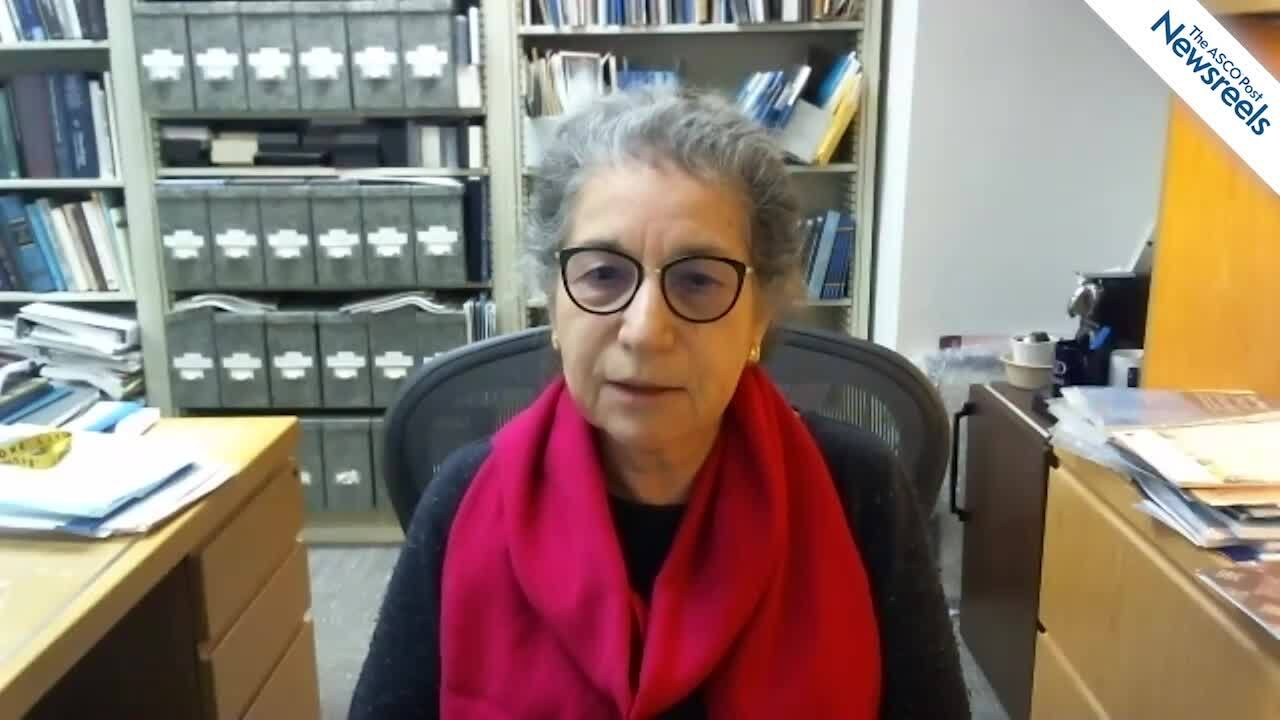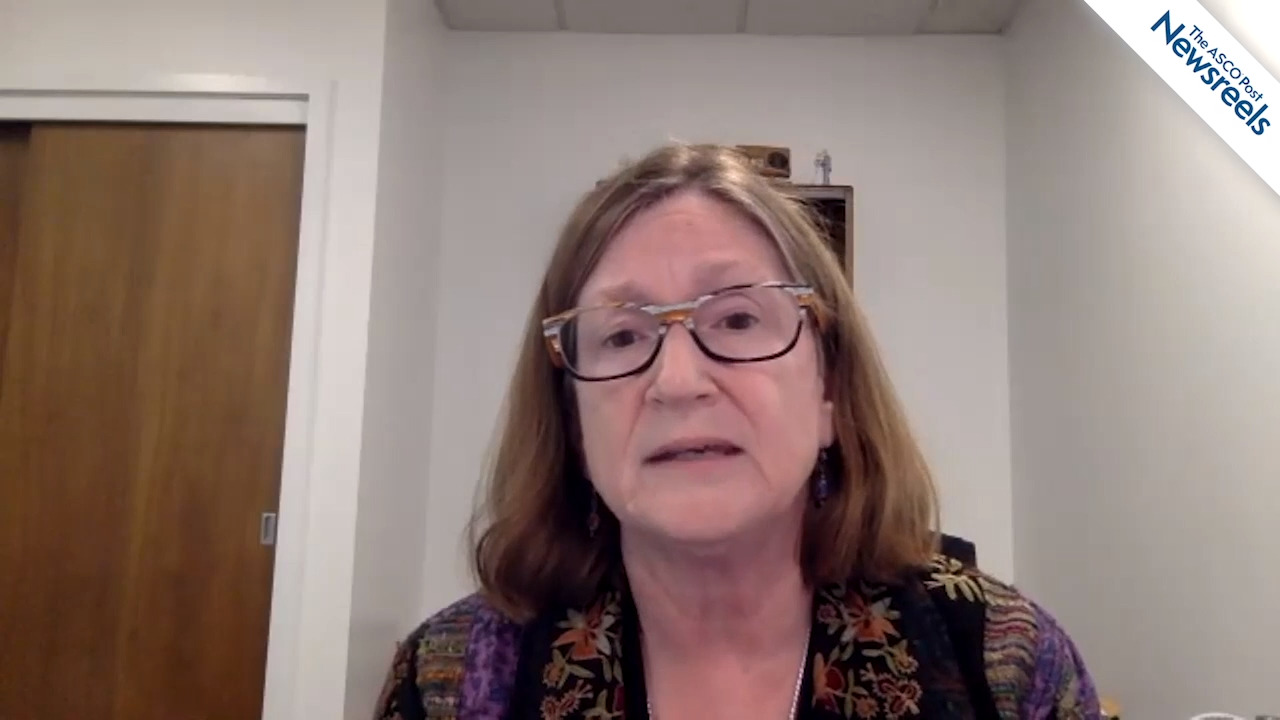Elizabeth A. Mittendorf, MD, PhD, on Her Plenary Lecture: Local Regional Management Following Neoadjuvant Therapy
Elizabeth A. Mittendorf, MD, PhD, of Brigham and Women’s Hospital, summarizes her plenary talk, which featured the uncertainties in treatment knowledge: excision of postchemotherapy calcifications; the best sentinel lymph node biopsy technique for patients with node-positive disease who convert to node-negative disease with neoadjuvant chemotherapy; whether immunohistochemistry should be routinely used for sentinel lymph node evaluation; and the role of radiation therapy in this patient population.
Distinct T-Cell Signature in Black Patients With Breast Cancer May Contribute to More Aggressive Disease
A research team has revealed a distinct molecular signature in the tumor tissues of Black patients with breast cancer. The new work, published by Yao et al in JNCI: Journal of the National Cancer Institute, reported that an elevated number of “exhausted,” nonfunctional T cells appears to lead to...
Subcutaneous Fixed-Dose vs Intravenous Pertuzumab/Trastuzumab for HER2-Positive Early Breast Cancer
As reported in The Lancet Oncology by Tan et al, the phase III FeDeriCa trial showed comparable pharmacokinetics and pathologic complete response rates with a subcutaneous (SC) fixed-dose combination of pertuzumab and trastuzumab vs the same combination administered intravenously (IV)—both given...
Surgical Intervention May Offer Survival Advantage for Certain Patients With Metastatic Breast Cancer
Surgery, in addition to treatments like chemotherapy and radiation therapy, may improve survival for certain patients with metastatic breast cancer. A research team studied nearly 13,000 patients with stage IV disease and found that those who had surgery in addition to other treatments had a...
Study Clarifies Time-Dependent Effects of Oral Contraceptives on Risk of Ovarian, Endometrial, and Breast Cancers
A comprehensive study involving more than 250,000 women showed that oral contraceptive use may be protective against the development of ovarian and endometrial cancers, but the effect on lifetime risk of breast cancer is more limited. The protective effect on ovarian and endometrial cancers was...
Addition of First-Line Pembrolizumab to Chemotherapy in Metastatic Triple-Negative Breast Cancer: KEYNOTE-355
As reported in The Lancet by Javier Cortes, MD, and colleagues, the phase III KEYNOTE-355 trial has shown that the addition of pembrolizumab to chemotherapy improved progression-free survival among previously untreated patients with locally recurrent inoperable or metastatic triple-negative breast...
Pembrolizumab Plus Chemotherapy for Locally Recurrent Unresectable or Metastatic Triple-Negative Breast Cancer
On November 13, 2020, pembrolizumab (Keytruda) was granted accelerated approval by the U.S. Food and Drug Administration (FDA) for use in combination with chemotherapy for patients with locally recurrent unresectable or metastatic triple-negative breast cancer with tumors expressing PD-L1 (Combined ...
CTC Enumeration Predicts Survival Early in Treatment of Metastatic Breast Cancer
The number of circulating tumor cells (CTCs) assessed at baseline and at about 1 month after cancer-directed treatment was strongly associated with overall survival in patients with metastatic breast cancer, according to a large retrospective pooled analysis reported at the 2020 San Antonio Breast...
RxPONDER: Many Postmenopausal Patients With Node-Positive Breast Cancer Can Avoid Chemotherapy
Just in are the results of the SWOG S1007 RxPONDER trial, which evaluated the benefit of chemotherapy in women with early-stage hormone receptor–positive, HER2-negative breast cancer and node-positive disease.1 The data showed that many postmenopausal women can skip adjuvant chemotherapy, based on ...
Sibylle Loibl, MD, on HR+ HER2– Primary Breast Cancer: Palbociclib and Endocrine Therapy
Sibylle Loibl, MD, of the German Breast Group, discusses the first phase III results from the PENELOPE-B study of palbociclib combined with endocrine therapy in patients with hormone receptor–positive, HER2-negative primary breast cancer who are at high risk for relapse after neoadjuvant chemotherapy (Abstract GS1-02).
Joyce V. Lee, PhD, on Triple-Negative Breast Cancer: MYC as a Predictor of Treatment Response
Joyce V. Lee, PhD, of the University of California, San Francisco, discusses data that suggest the MYC oncogene may indicate whether a patient with triple-negative breast cancer will respond to immunotherapy. Dr. Lee’s study is the first to describe MYC downregulation of MHC-I and to demonstrate translatable approaches that may overcome immune evasion (Abstract GS1-08).
Roisin M. Connolly, MD, on HR+ Advanced Breast Cancer: Endocrine Therapy and Entinostat
Roisin M. Connolly, MD, of University College Cork, discusses phase III results from the E2112 trial, which showed exemestane plus entinostat did not improve survival in aromatase inhibitor–resistant advanced HR-positive, HER2-negative breast cancer (Abstract GS4-02).
FDA Approves Margetuximab-cmkb Plus Chemotherapy for Previously Treated Patients With Metastatic HER2-Positive Breast Cancer
On December 16, the U.S. Food and Drug Administration (FDA) approved margetuximab-cmkb (Margenza) in combination with chemotherapy for the treatment of adult patients with metastatic HER2-positive breast cancer who have received two or more prior anti-HER2 regimens, at least one of which was for...
Lee S. Schwartzberg, MD, on HER2– HR+ Breast Cancer: Tesetaxel and Capecitabine
Lee S. Schwartzberg, MD, of the West Cancer Center, discusses phase III results from the CONTESSA study, which showed that an all-oral regimen of tesetaxel plus a reduced dose of capecitabine significantly improved progression-free survival compared with capecitabine alone in patients with HER2-negative, hormone receptor–positive metastatic breast cancer previously treated with a taxane (Abstract GS4-01). Editor's note: On March 22, 2021, Odonate Therapeutics announced it was discontinuing the development of tesetaxel and will close the company's operations. Read more here.
Sara A. Hurvitz, MD, on Triple-Negative Breast Cancer: Sacituzumab Govitecan and Chemotherapy
Sara A. Hurvitz, MD, of the David Geffen School of Medicine at UCLA, discusses phase III data from the ASCENT study of the antibody-drug conjugate sacituzumab govitecan vs chemotherapy in patients with previously treated metastatic triple-negative breast cancer (Abstract GS3-06).
Patricia A. Ganz, MD, on Younger Breast Cancer Survivors: Managing Depression
Patricia A. Ganz, MD, of the University of California, Los Angeles, discusses study findings that showed mindfulness meditation and survivorship education may effectively reduce depression and related symptoms such as fatigue and sleep disturbance, which pose serious threats to younger women’s health and well-being after being treated for cancer (Abstract GS2-10).
Joseph A. Sparano, MD, on HR+, HER2– Breast Cancer: Individualizing Prognosis and Predicting Treatment Success
Joseph A. Sparano, MD, of the Montefiore Medical Center and Albert Einstein College of Medicine, discusses the development and validation of a tool that integrates the 21-gene recurrence score and clinicopathologic features to individualize prognosis for distant recurrence and predict chemotherapy benefit in patients with early breast cancer with greater precision (Abstract GS4-10).
Addition of Chemotherapy to Local Therapy in Women Aged 70 or Older With Triple-Negative Breast Cancer
In a National Cancer Database analysis reported in The Lancet Oncology, Crozier et al found that receipt of neoadjuvant or adjuvant chemotherapy was associated with improved overall survival among women aged 70 or older undergoing surgery for stage I to III triple-negative breast cancer. Study...
Nadia Harbeck, MD, on Early Breast Cancer: Endocrine Therapy After Preoperative Treatment
Nadia Harbeck, MD, of the University of Munich, discusses the first outcome data from the phase III ADAPT HR+/HER– trial, which combined both static and dynamic biomarkers to optimize the adjuvant therapy approach in patients with intermediate- or high-risk luminal early breast cancer (Abstract GS4-04).
Cost-Effectiveness of Neoadjuvant/Adjuvant Treatment Strategies for HER2-Positive Breast Cancer
In a study reported in JAMA Network Open, Kunst et al compared five neoadjuvant-adjuvant treatment strategies for patients with HER2-positive breast cancer and identified one that was associated with both improved outcomes and cost savings. The researchers found that a strategy of neoadjuvant...
SABCS 2020: CTC Enumeration May Be Predictive of Survival During Treatment for Metastatic Breast Cancer
The number of circulating tumor cells (CTCs) assessed at baseline and about 1 month after cancer-directed treatment was associated with overall survival in patients with metastatic breast cancer, according to findings from a large retrospective pooled analysis reported by Wolfgang Janni, MD, PhD,...
SABCS 2020: Patient-Reported Outcomes From the Phase III IMpassion031 Trial
Adding an immune checkpoint inhibitor to a standard chemotherapy regimen for patients with early-stage triple-negative breast cancer did not affect patients’ ability to perform day-to-day activities more than treatment with chemotherapy alone, according to research presented by Elizabeth...
SABCS 2020: New Prognostic Tool to Determine Individual Risk of Distant Recurrence, Benefit of Adjuvant Chemotherapy in Early Breast Cancer
In a study presented at the 2020 San Antonio Breast Cancer Symposium (Abstract GS4-10) and concurrently published in the Journal of Clinical Oncology, Joseph A. Sparano, MD, and colleagues described the development and validation of a new prognostic tool. RSClin integrates the 21-gene recurrence...
SABCS 2020: RxPONDER Study Shows Postmenopausal Patients With Node-Positive Breast Cancer May Be Able to Avoid Chemotherapy
Just in are the results of the SWOG S1007 RxPONDER trial, which evaluated the benefit of chemotherapy in women with early-stage, hormone receptor (HR)-positive, node-positive breast cancer. Based on the findings, many postmenopausal women may be able to safely skip adjuvant chemotherapy. However,...
SABCS 2020: Follow-up Data From monarchE Show Continued Abemaciclib Benefit in High-Risk, HR-Positive, HER2-Negative Breast Cancer
Extended follow-up results from the phase III monarchE trial showed that adding the cyclin-dependent kinase inhibitor abemaciclib to standard adjuvant endocrine therapy continued to improve invasive disease–free survival in patients with high-risk, node-positive, early-stage, hormone receptor...
SABCS 2020: Can Mindfulness Meditation and Survivorship Education Help to Reduce Depression in Young Breast Cancer Survivors?
New research showed that behavioral interventions—mindfulness meditation and survivorship education classes—may be effective in reducing depressive symptoms in younger breast cancer survivors. This patient population often experiences the highest levels of depression, stress, and fatigue, which may ...
Debra A. Pratt, MD, on Time to Completion of Breast Cancer Treatment and Survival
In her recent study, Debra A. Pratt, MD, of the Cleveland Clinic, showed that when breast cancer treatment using any of three modalities takes longer than 38 weeks, it is associated with a decrease in survival, regardless of the receptor status. Patients with breast cancer who received neoadjuvant chemotherapy were more likely to take longer than 38 weeks to complete treatment than those undergoing surgery first (Abstract S11-34 ).
Chirag Shah, MD, on Assessing DCIS Recurrence Risk
Chirag Shah, MD, of the Cleveland Clinic, discusses the impact of DCISionRT testing on radiation therapy recommendations for patients with ductal carcinoma in situ following lumpectomy. His study found that despite using traditional favorable-risk criteria, radiation recommendations were changed in more than 40% of patients (Abstract PS6-17).
Staying a Step Ahead of Cancer
When I was diagnosed with metastatic breast cancer in 2018, my first thought was, I hope my three young children do not lose two parents to cancer. My husband, Ricky, had survived two bouts of cancer, early-stage colorectal cancer and, most recently, stage I kidney cancer. Like Ricky’s two...
Improved Outcomes With Neoadjuvant Paclitaxel Plus Trastuzumab/Lapatinib vs Paclitaxel/Trastuzumab in HER2-Positive Breast Cancer
In a 7-year follow-up of the phase III CALGB 40601/Alliance trial reported in the Journal of Clinical Oncology, Aranzazu Fernandez-Martinez, MD, of Lineberger Comprehensive Center, University of North Carolina, Chapel Hill, and colleagues found that neoadjuvant paclitaxel combined with a dual...
No Reduced Recurrence Risk With Perioperative Aromatase Inhibitor Use in HR-Positive Breast Cancer
In the UK phase III POETIC trial reported in The Lancet Oncology, Ian Smith, MD, of The Royal Marsden NHS Foundation Trust, London, and colleagues, found that perioperative aromatase inhibitor therapy did not reduce the risk of recurrence in postmenopausal women with hormone receptor (HR)-positive...
Immunotherapy for Triple-Negative Breast Cancer: An Evolving Story
Immunotherapy with checkpoint inhibitors, established as a treatment of many solid tumors, may be finding a role in the treatment of breast cancer. The current state of the art regarding immunotherapy for triple-negative breast cancer was the focus of a talk by Heather L. McArthur, MD, MPH, Medical ...
Understanding Breast Cancer Diagnosis and Treatment Disparities in Resource-Challenged Nations
Cancer is the second leading cause of death in the Caribbean. Adding to this growing burden, many of the nations in this geographically spread region have under-resourced health-care systems and a lack of cohesive approaches to the delivery of cancer care. To shed light on the public health...
SABCS 2020: Patients With Breast Cancer Undergoing Radiotherapy May Have Underrecognized Side Effects
Among patients with breast cancer treated with radiotherapy, symptoms were commonly underrecognized in reports of pain, pruritus, edema, and fatigue, with younger patients and Black patients having significantly increased odds of symptom underrecognition. These findings were reported by Reshma...
SABCS 2020: Opioid and Sedative-Hypnotic Use After Mastectomy With Reconstructive Surgery
Women who undergo mastectomy with reconstructive surgery as part of breast cancer treatment may face the risk of persistent use of opioids and sedative-hypnotic drugs, according to data presented by Jacob Cogan, MD, and colleagues at the 2020 San Antonio Breast Cancer Symposium (Abstract GS3-08)....
SABCS 2020: Meta-analysis of Pregnancy Outcomes in Breast Cancer Survivors
A large meta-analysis of breast cancer survivors of childbearing age indicated that they are less likely than the general public to become pregnant and may face a higher risk of certain complications, such as preterm labor. However, most survivors who do become pregnant deliver healthy babies and...
SABCS 2020: Radiotherapy Omission After Breast-Conserving Surgery for Older Patients With HR-Positive Breast Cancer
Patients aged 65 or older with hormone receptor (HR)-positive breast cancer who did not receive radiation therapy after breast-conserving surgery had higher rates of local recurrence but similar 10-year survival rates when compared to patients who received postoperative radiation therapy, according ...
Circulating Tumor DNA and Disease-Free Survival in Patients With Breast Cancer
In a systematic review and meta-analysis reported in JAMA Network Open, Cullinane et al found that higher levels of plasma circulating tumor DNA (ctDNA) were associated with poorer disease-free survival in patients with both early and advanced breast cancer, with the association being stronger with ...
Analysis of Adjuvant Therapies for Early-Stage Triple-Negative Breast Cancer
In a population-based cohort study reported in JAMA Network Open, Zhai et al found that adjuvant therapies were associated with improved overall survival among patients with stage I (T1 N0 M0) triple-negative breast cancer, with adjuvant chemotherapy being associated with improved breast...
End-of-Life Care Among Commercially Insured Women Younger Than 65 With Metastatic Breast Cancer
In a study reported in JCO Oncology Practice, Ferrario et al found a sizable increase in end-of-life intensive care unit (ICU) admissions and a small but significant increase in emergency department visits over time among commercially insured women younger than age 65 with metastatic breast cancer...
Trends in Positive BRCA Test Results Among Women Aged 65 and Older in the United States
In a study reported in JAMA Network Open, Guo et al found that the proportion of positive BRCA genetic test results markedly declined between 2008 and 2018 among women aged ≥ 65 years in the United States, with the trend likely reflecting what the investigators call a loosening of testing criteria...
No Reduction in Recurrence Risk With Perioperative Aromatase Inhibitor Therapy in Postmenopausal Patients With HR-Positive Breast Cancer
As reported in The Lancet Oncology by Ian E. Smith, MD, and colleagues, the phase III POETIC trial found that perioperative aromatase inhibitor therapy did not reduce the risk of disease recurrence in postmenopausal women with hormone receptor (HR)-positive early breast cancer vs no perioperative...
Effect of Fertility Preservation on Reproductive Outcomes in Patients After Breast Cancer
In a Swedish nationwide cohort study reported in JAMA Oncology, Marklund et al found that women who had undergone fertility preservation had a higher live birth rate, were more likely to use assisted reproductive technology, and had better overall survival after breast cancer than women who had not ...
Yes, Men Get Breast Cancer, Too
You could call it a sixth sense, but the moment I felt a lump in my left breast I knew it was cancer, although it would take several weeks to confirm the diagnosis. When I saw my primary cancer physician and told him of my concern, he said: “Don’t worry. Men don’t get breast cancer; it’s a woman’s...
Final Efficacy Results From ExteNET Trial of Neratinib in Subgroup of Patients With HR-Positive, HER2-Positive Early Breast Cancer
In an analysis from the phase III ExteNET trial reported in Clinical Breast Cancer, Arlene Chan, MD, of the Breast Cancer Research Centre of Western Australia and Curtin University, Perth, and colleagues, found significant improvements in efficacy outcomes with administration of neratinib vs...
Addition of Abemaciclib to Endocrine Therapy Improves Invasive Disease–Free Survival in High-Risk Early Breast Cancer
As reported in the Journal of Clinical Oncology by Stephen R.D. Johnston, MD, PhD, of the Royal Marsden NHS Foundation Trust, London, and colleagues, an interim analysis in the phase III monarchE trial has shown that adjuvant abemaciclib plus endocrine therapy significantly improved invasive...
Final Analysis of SOLAR-1: 8-Month Survival Benefit Misses Statistical Significance for Alpelisib
The statistically significant benefit of alpelisib in reducing disease progression, as reported at the European Society for Medical Oncology (ESMO) Congress 2 years ago, did not translate into a significant improvement in overall survival, although a numerical 8-month gain was observed in the final ...
Growing Interest in Antiandrogens to Treat Male Breast Cancer
“There has been a lot of interest in the development of new antiandrogens” for clinical use in patients with breast cancer,” Anthony D. Elias, MD, reported in an update on male breast cancer at the 2020 Lynn Sage Breast Cancer Symposium, sponsored by the Robert H. Lurie Comprehensive Cancer Center...
Mode of Detection of High-Risk Breast Cancer Linked to Prognosis
Breast cancers detected between mammographic screenings carry a worse prognosis than those detected at the time of screening, even when tumor biology is similar, according to research presented at the 12th European Breast Cancer Conference (EBCC 12), which was held virtually this year.1 The 8-year...
MINDACT at 8.7 Years: Primary Findings Confirmed
Long-term analysis of the phase III MINDACT trial, with a median follow-up of 8.7 years, confirmed that the 70-gene signature MammaPrint assay can identify which patients with breast cancer can safely forgo adjuvant chemotherapy, reported Emiel Rutgers, MD, PhD, FRCS, a surgical oncologist at the...











